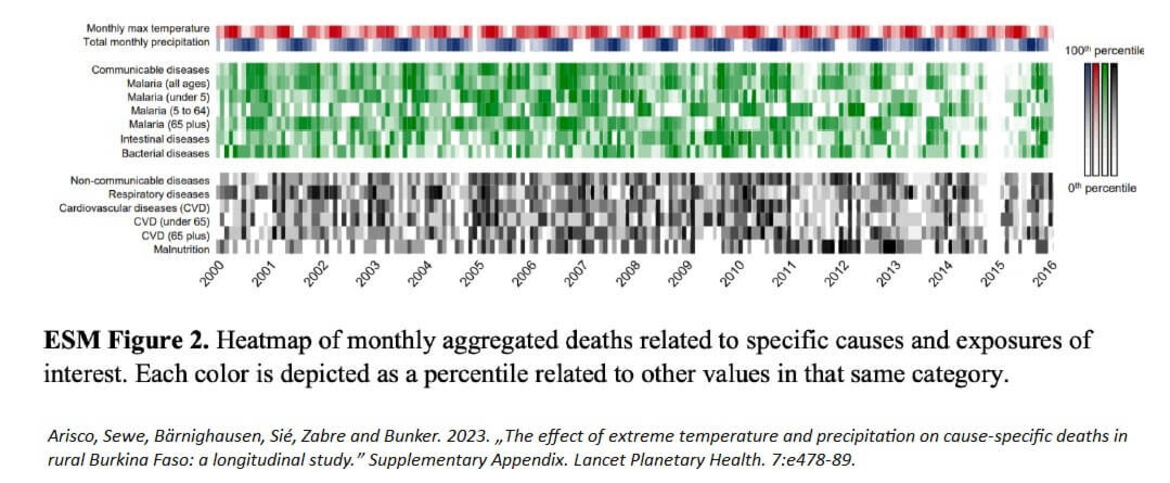-
Working Groups
- Climate Change and Health Intervention
- Climate Change, Nutrition and Health
- Climate Change, Migration and Health
- Heidelberg Planetary Health Hub (Hei-Planet)
- Climate-smart Health Systems
- Closing pandemic health gaps
- Design and implementation research in global health
- Digital Global Health
- Disease Control in Disadvantaged Populations
- Epidemiology and Biostatistics
- Epidemiology of Transition
- FAIR and ethical data and sample reuse
- Field Epidemiology Research in German Public Health
- Global Child Health
- Global Health and Economics Research Group
- Global Health Diagnostics
- Global Health Policies and Systems
- Health Economics and Health Financing
- Health Policy and Integrated Knowledge Translation
- Implementation research for prevention and disease control
- Injury Epidemiology and Prevention
- Mathematical Modelling of Infectious Diseases
- Non-communicable disease (NCD) in LMICs
- Non-Communicable Diseases (NCDs) Implementation Research
- Oral Health
- Planetary Child Health
- Science Communication
- Vector Borne Diseases and Geo Health
HEAT EXPOSURE AND RESPONSE

With climate change-induced extreme weather becoming more common, threats to human health due to climate-sensitive diseases are increasing with uneven impacts on populations around the world. The links between weather conditions and climate-sensitive disease burdens are especially pronounced in low-income communities, further highlighting the need to study the impacts of extreme weather on the world’s most vulnerable people. Team member research indicates that climate change adaptation strategies should incorporate mitigating negative health aspects caused by extreme temperature.
Team Member Research (selected)
Rapid population ageing coupled with climate change is a significant public health concern. Understanding how temperature links to health problems is a key way to prevent illnesses and deaths related to heat and cold, especially in vulnerable groups such as the elderly. We conducted a systematic review and meta-analysis on the impacts ambient hot and cold temperature have on elderly (65+) morbidity and mortality, excluding heat and cold wave only studies. The analysis revealed that a 1°C temperature increase resulted in elevated risks for temperature-induced cerebrovascular, cardiovascular, diabetes, genitourinary, infectious disease, heat-related and respiratory outcomes.
Using de-identified, daily cause-of-death data collected in the Health and Demographic Surveillance System led by the Centre de Recherche en Santé de Nouna (CRSN) in the National Institute of Public Health of Burkina Faso, we assessed the temporal associations between weather conditions (both daily and weekly for maximum temperature and total precipitation) and the deaths attributed to specific climate-sensitive diseases. The findings indicate testing and implementing climate preparedness programs can decrease the extreme weather-related death burden and lower deaths from climate-sensitive diseases in vulnerable populations.
Additional insights into the association between temperature and mortality can be gained by exploring the effects temperature has on years of life lost when considering life expectancy at the time of death. Looking into low-, middle- and high-income sites in Burkina Faso, India, Kenya, Sweden and the USA, the results across the study sites indicated years of life lost were associated with both low and high temperature.
With data from the Nouna Health and Demographic Surveillance System in Burkina Faso, we conducted daily time series regression analysis to understand the association between heat exposure and years of life lost from non-communicable diseases between 2000 and 2010. We found that premature death from non-communicable diseases increased significantly with both moderate and extreme heat exposure.
Contributors
Nick Arisco
Till Bärnighausen
Aditi Bunker
Joacim Rocklöv
Maquins Odhiambo Sewe
-
Working Groups
- Climate Change and Health Intervention
- Climate Change, Nutrition and Health
- Climate Change, Migration and Health
- Heidelberg Planetary Health Hub (Hei-Planet)
- Climate-smart Health Systems
- Closing pandemic health gaps
- Design and implementation research in global health
- Digital Global Health
- Disease Control in Disadvantaged Populations
- Epidemiology and Biostatistics
- Epidemiology of Transition
- FAIR and ethical data and sample reuse
- Field Epidemiology Research in German Public Health
- Global Child Health
- Global Health and Economics Research Group
- Global Health Diagnostics
- Global Health Policies and Systems
- Health Economics and Health Financing
- Health Policy and Integrated Knowledge Translation
- Implementation research for prevention and disease control
- Injury Epidemiology and Prevention
- Mathematical Modelling of Infectious Diseases
- Non-communicable disease (NCD) in LMICs
- Non-Communicable Diseases (NCDs) Implementation Research
- Oral Health
- Planetary Child Health
- Science Communication
- Vector Borne Diseases and Geo Health
